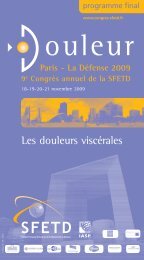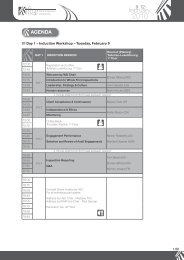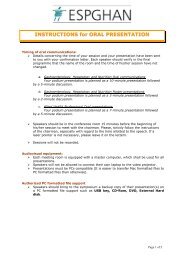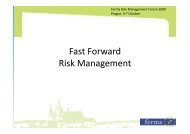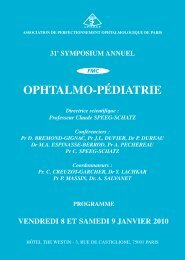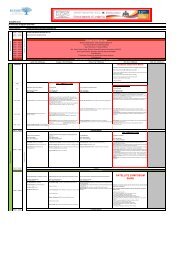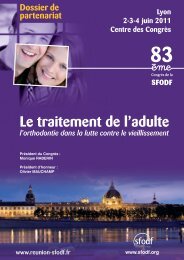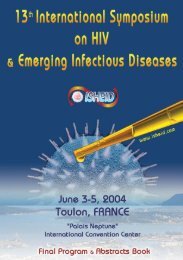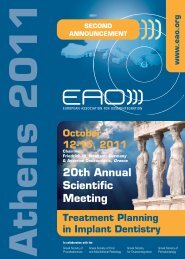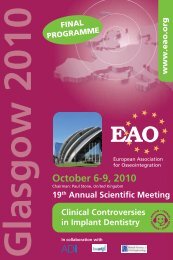final program.qxd - Parallels Plesk Panel
final program.qxd - Parallels Plesk Panel
final program.qxd - Parallels Plesk Panel
Create successful ePaper yourself
Turn your PDF publications into a flip-book with our unique Google optimized e-Paper software.
PP 5.5<br />
Fulminant Candida albicans peritonitis and ascites in a HIV-HCV co-infected patient,<br />
possibly prompted by a prolonged self-administration of nimesulide<br />
Roberto Manfredi, Sergio Sabbatani<br />
Infectious Diseases, University of Bologna, Italy<br />
Introduction<br />
The mortality rate of HIV-infected patients (p) with concurrent liver disease is steadily<br />
increasing.<br />
Case Report<br />
An exceedingly rare case of Candida albicans fulminant peritonitis and ascites in a p with<br />
HIV-HCV-coinfection, but no prior history of liver cirrhosis, which was possibly related to<br />
exaggerated self-administered nimesulide,is reported. A 46-year-old p with HIV infection<br />
recognized since 14 years received isolated lamivudine-stavudine therapy since six years<br />
with a favorable laboratory response, as expressed by a plasma viremia of 480 HIV-RNA<br />
copies/mL, and a CD4+ lymphocyte count of 428 cells/µL. Neither liver biopsy nor<br />
specific treatment were performed for a concurrent stable HCV infection. Two months<br />
before admission, our p suffered from a shoulder fracture, and uncontrolled nimesulide<br />
self-medication was performed during six consecutive weeks. A rapidly worsening ascites<br />
and oliguria led to hospital admission. Slightly increased serum ALT, amylase, and<br />
bilirubin were detected, but a rapidly increasing ascites and diffuse edema occurred,<br />
paracentesis, and diuretic-albumin administration failed to improve the clinical picture, and<br />
the worsening ascites and anuria evolved into hyperacute kidney failure. One day later our<br />
p deceased, and necropsy studies showed a diffuse polyvisceritis and hepatitis with<br />
abundant ascites, in absence of kidney and urinary tract abnormalities, and liver cirrhosis.<br />
After patient's death, multiple ascites cultures yielded isolated Candida albicans.<br />
Conclusions<br />
HIV-infected p have increased risks of liver toxicity. Non-steroideal anti-inflammatory<br />
drugs (NSAID) are implicated in severe, sometimes lethal hepatotoxicity. The exceedingly<br />
rapid-severe evolution towards a Candida-infected ascites associated with refractory<br />
anuria, in absence of decompensated cirrhosis, acute hepatotoxicity, and kidney<br />
involvement at autopsy, was never observed after NSAID/nimesulide use. Animal models<br />
showed a NSAID-induced increased enteric vascular permeability causing infectious<br />
peritonitis. In conclusion, clinicians who face p with chronic hepatitis but no<br />
decompensated cirrhosis, should remind that NSAID may act on liver-bowel function, and<br />
could prompt a liver-kidney damage, possibly complicated with infectious ascites.<br />
“ Focusing FIRST on PEOPLE “ 212 w w w . i s h e i d . c o m



